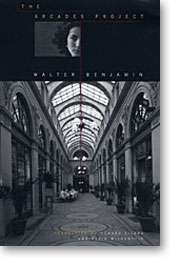The Arcades Project

Editorial Harvard University Press
Fecha de edición diciembre 1999
Idioma inglés
EAN 9780674008021
1088 páginas
Libro
encuadernado en tapa blanda
Resumen del libro
"To great writers," Walter Benjamin once wrote, "finished works weigh lighter than those fragments on which they labor their entire lives." Conceived in Paris in 1927 and still in progress when Benjamin fled the Occupation in 1940, The Arcades Project (in German, Das Passagen-Werk) is a monumental ruin, meticulously constructed over the course of thirteen years--"the theater," as Benjamin called it, "of all my struggles and all my ideas."
Focusing on the arcades of nineteenth-century Paris-glass-roofed rows of shops that were early centers of consumerism--Benjamin presents a montage of quotations from, and reflections on, hundreds of published sources, arranging them in thirty-six categories with descriptive rubrics such as "Fashion," "Boredom," "Dream City," "Photography," "Catacombs," "Advertising," "Prostitution," "Baudelaire," and "Theory of Progress." His central preoccupation is what he calls the commodification of things--a process in which he locates the decisive shift to the modern age.
The Arcades Project is Benjamin's effort to represent and to critique the bourgeois experience of nineteenth-century history, and, in so doing, to liberate the suppressed "true history" that underlay the ideological mask. In the bustling, cluttered arcades, street and interior merge and historical time is broken up into kaleidoscopic distractions and displays of ephemera. Here, at a distance from what is normally meant by "progress," Benjamin finds the lost time(s) embedded in the spaces of things.
Biografía del autor
Nació en Berlín en 1892, en el seno de una próspera familia judía. Estudió filosofía y se licenció en Berna en 1918 con una tesis sobre el concepto de crítica del arte en el Romanticismo alemán. Trabajo singular con el que sin embargo no consiguió integrarse en la institución académica, aunque su nombre se asocia indefectiblemente con la formación temprana de la Escuela de Frankfurt. Influido por la mística judía y el marxismo, dejó una obra polifacética en la que se combina la filosofía, la sociología y la crítica literaria, y cuya influencia ha ido creciendo exponencialmente desde su muerte. Se quitó la vida en Portbou, al creer que las autoridades lo devolverían a los nazis, de los que huía, de una manera o de otra, desde 1933.








